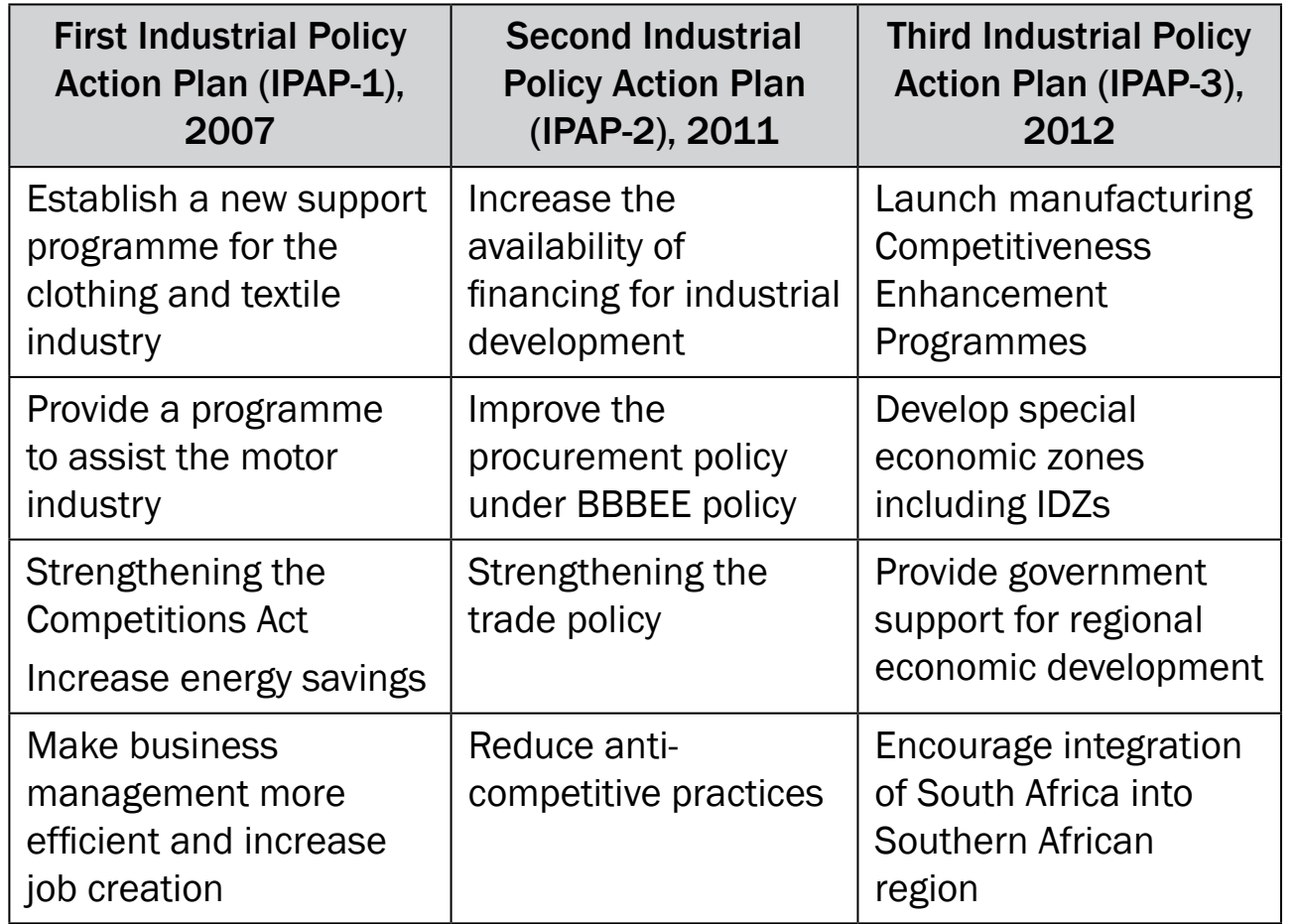Photo AI
Last Updated Sep 24, 2025
SA Industrial Development Simplified Revision Notes for NSC Economics
Revision notes with simplified explanations to understand SA Industrial Development quickly and effectively.
466+ students studying
SA Industrial Development
Comprehending the evolution of South Africa's industrial development is essential as the historical phases have profoundly influenced the nation's economic landscape, shaping its present-day strategies.
History of Industrial Development
Early 20th Century: Import Substitution
- Import Substitution: A strategy aimed at reinforcing domestic industries by minimising dependence on imports.
- Historical Context: This approach concentrated on nurturing local industries to develop a self-sufficient economy following the colonial era.
Import substitution served as a cornerstone for job creation and bolstered the manufacturing sector.
1970s - 1990s: Export Promotion
- Transition to export-oriented policies, which facilitated greater integration with global trade.
- International Trade Agreements: Enabled access to new markets, aiding industrial growth.
- Outcomes: Led to increased exports and stronger international economic connections.
Trade agreements played a vital role in securing access to new markets, fostering economic expansion.
Post-Apartheid Era: NIPF and IPAP
- NIPF: National Industrial Policy Framework — designed to establish a diversified and sustainable economy.
- IPAP: Industrial Policy Action Plans — focuses on economic inclusivity, particularly involving historically marginalised communities.
Post-apartheid strategies aim to incorporate historically marginalised groups into the economic mainstream.
Socio-Economic Contexts
- Key Developments:
- Transition to democracy.
- Effects of globalisation.
- Economic reform efforts.
- Impacts:
- GDP growth rates.
- Shifts in employment distribution.
- Changes in industrial structures.
Social and political transformations have significantly influenced policy direction.
Economic Contributions and Diversification
- Sector Contributions:
- Agriculture: Traditionally the economic backbone.
- Mining: Integral to export activities.
- Manufacturing: A primary driver of industrial growth.
- Services: Focused on sustainable development.
- Diversification Efforts: Expansion of the service sector to enhance sustainable growth.
Key Policies
- Industrial Policies play a crucial role in driving economic growth in South Africa. They include strategic frameworks like the National Industrial Policy Framework (NIPF) to enhance labour markets.
- NIPF Specifics:
- Market Enhancement: Aims to improve employment conditions.
- Diversification Efforts: Promotes variety across sectors.
Industrial Policies: Government interventions aimed at bolstering economic and industrial growth.
Detailed Examination of Key Policies
National Industrial Policy Framework (NIPF)
- Objectives:
- Encourage economic diversification.
- Support labour-intensive industries.
- Increase exports.
- Impact Analysis:
- Achieved a 15% rise in export rates over a decade.
- Growth in the automotive and manufacturing sectors.
Economic Diversification: Expanding a country's range of economic activities to reduce reliance on specific sectors.
Industrial Policy Action Plans (IPAP)
- Focus Areas: Manufacturing, technology, and green industries.
- Achievements: Notably increased employment through a strategic reorientation.
Sector-specific Policies & Initiatives
- Competitiveness Enhancement Programs:
- Drive global competitiveness and innovation.
- Key Sectors: Technology and manufacturing supported through grants.
SMMEs (Small, Medium & Micro Enterprises): Essential for job creation and economic innovation.
Sector-Specific Initiatives
Mining
- Policy Effects:
- Job creation and export growth.
- Adoption of sustainable practices for long-term viability.
Manufacturing
- Government Support: Provides tax incentives and grants.
- Example: A manufacturing company receiving tax incentives invested in new equipment, resulting in a 20% increase in production output and the ability to hire 15 additional workers.
Renewable Energy
- Achievements in Coega and Richards Bay:
- Progress in sustainability initiatives.
- Positive impact on regional GDP.
Technology
- Influence: Sustains GDP growth and employment.
- Promotes digital innovation.
Challenges and Opportunities
Challenges
- Infrastructure Deficits
- Definition: Insufficient facilities, such as transportation and energy, restrict industrial growth.
- Skill Shortages
- A workforce lacking adequate skills reduces productivity.
- Economic Constraints
- Limited investment restricts growth potential.
- Policy Framework and Scale
- Inefficiencies and barriers that hinder progress.
Opportunities
- Infrastructure Improvements: Could enhance industrial zones and export potential.
- Education and Skills Development: Partnerships between industry and academia offer essential skills training.
Visual References
Evolution of Policies

Sector Contributions

Policy Connections

SWOT Analysis

Practice Questions with Solutions
-
Discuss the impact of industrial policies on renewable energy in South Africa.
Solution: Industrial policies have significantly impacted renewable energy in South Africa through initiatives like the Renewable Energy Independent Power Producer Procurement Programme (REIPPPP). These policies have attracted investment in solar and wind projects, creating jobs and reducing carbon emissions. The Coega and Richards Bay industrial zones demonstrate how policy-driven development has established renewable energy hubs that contribute to regional economic growth while addressing energy security challenges.
-
Analyse the Coega Development Corporation's success factors.
Solution: The Coega Development Corporation's success stems from strategic location near port facilities, government policy support through Special Economic Zone status, diversified sector focus including manufacturing and renewable energy, effective infrastructure development, and strong partnerships with private sector entities. These factors have enabled it to attract significant investment and create sustainable employment opportunities.
-
Evaluate the positive influences of government support in manufacturing.
Solution: Government support in manufacturing has yielded positive outcomes through: tax incentives that have increased capital investment and productivity; grant programmes that have supported technological upgrades and innovation; skills development initiatives that have improved workforce capabilities; export promotion that has expanded market access; and industrial parks that have created conducive environments for manufacturing clusters, collectively strengthening South Africa's manufacturing competitiveness.
-
Predict future policy impacts on the technology sectors.
Solution: Future policies will likely accelerate digital transformation across South African industries through increased R&D funding, digital skills development programmes, and incentives for tech entrepreneurship. We can expect policies promoting digital inclusion, supporting tech startups, and creating innovation hubs that connect academic research with industry applications, ultimately positioning South Africa as a regional technology leader.
-
Which sector has seen the most employment increase due to policies?
Solution: The manufacturing sector has experienced the most significant employment growth due to industrial policies, particularly through the automotive industry support programmes under IPAP. These initiatives have created direct manufacturing jobs and stimulated employment throughout the supply chain, including component manufacturing, logistics, and services supporting the automotive industry.
-
Describe foreign investment shifts resulting from sector-specific initiatives.
Solution: Sector-specific initiatives have redirected foreign investment from traditional mining toward manufacturing, renewable energy, and technology. The automotive sector has attracted significant foreign investment through the Automotive Production and Development Programme. Renewable energy initiatives have drawn international developers and financiers, while technology sector policies have encouraged multinational tech companies to establish regional hubs in South Africa, diversifying the foreign investment portfolio.
500K+ Students Use These Powerful Tools to Master SA Industrial Development For their NSC Exams.
Enhance your understanding with flashcards, quizzes, and exams—designed to help you grasp key concepts, reinforce learning, and master any topic with confidence!
260 flashcards
Flashcards on SA Industrial Development
Revise key concepts with interactive flashcards.
Try Economics Flashcards39 quizzes
Quizzes on SA Industrial Development
Test your knowledge with fun and engaging quizzes.
Try Economics Quizzes7 questions
Exam questions on SA Industrial Development
Boost your confidence with real exam questions.
Try Economics Questions2 exams created
Exam Builder on SA Industrial Development
Create custom exams across topics for better practice!
Try Economics exam builder71 papers
Past Papers on SA Industrial Development
Practice past papers to reinforce exam experience.
Try Economics Past PapersOther Revision Notes related to SA Industrial Development you should explore
Discover More Revision Notes Related to SA Industrial Development to Deepen Your Understanding and Improve Your Mastery
96%
114 rated
Industrial Development Policies
South Africa's Industrial Policies
288+ studying
195KViews96%
114 rated
Industrial Development Policies
Industrial Development Incentives
439+ studying
199KViews96%
114 rated
Industrial Development Policies
Regional Policy Effectiveness
318+ studying
199KViews96%
114 rated
Industrial Development Policies
Industrial Development Policies
447+ studying
192KViews